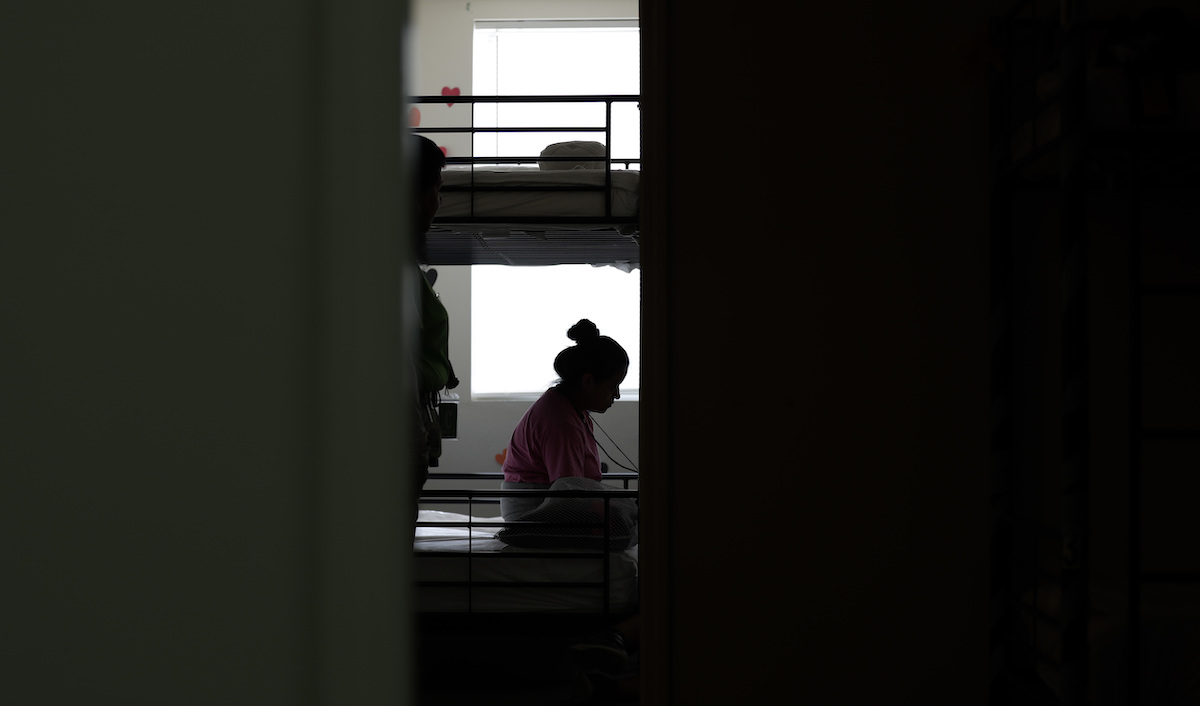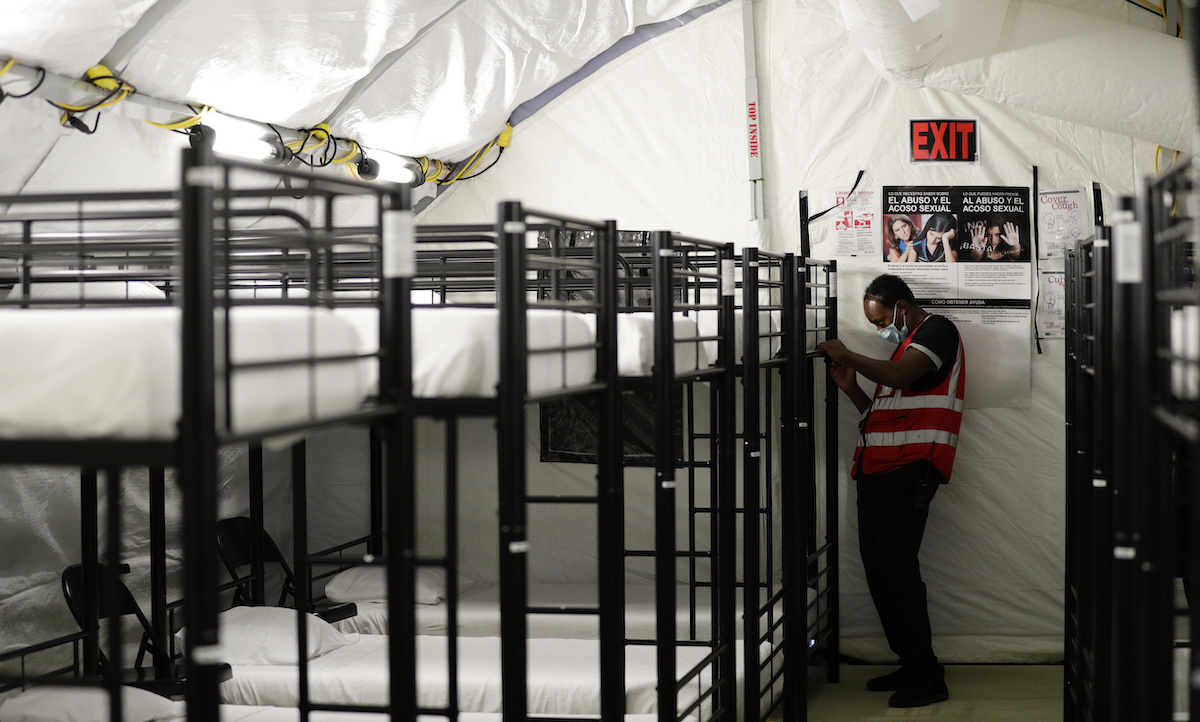

In this July 9, 2019, photo, a young woman sits in her room at the U.S. government’s newest holding center for migrant children in Carrizo Springs, Texas. (AP Photo/Eric Gay)
By NOMAAN MERCHANT, Associated Press
CARRIZO SPRINGS, Texas (AP) — A former oilfield worker camp off a dirt road in rural Texas has become the U.S. government’s newest holding center for detaining migrant children after they leave Border Patrol stations, where complaints of overcrowding and filthy conditions have sparked a worldwide outcry.
Inside the wire fence that encircles the site are soccer fields, a giant air-conditioned tent that serves as a dining hall, and trailers set up for use as classrooms and as places where children can call their families.
The long trailers once used to house workers in two-bedroom suites have been converted into 12-person dorms, with two pairs of bunk beds in each bedroom and the living room.
The Department of Health and Human Services said about 225 children are being held at the site in Carrizo Springs, with plans to expand to as many as 1,300, making it one of the biggest camps in the U.S. government system.
The government said the holding center will give it much-needed capacity to take in more children from the Border Patrol and prevent their detention in stations like the one in Clint, Texas, where lawyers last month reported some 250 youngsters were being held in cells with inadequate food, water and sanitation.
HHS said the Carrizo Springs location is a comfortable environment for children while they wait to be placed with family members or sponsors in the U.S.


In this July 9, 2019, photo, a staff member works in the infirmary, a series of tents, at the U.S. government’s newest holding center for migrant children in Carrizo Springs, Texas. (AP Photo/Eric Gay)
But immigrant advocates and others liken such places to child prison camps and worry that the isolated location 110 miles (180 kilometers) from San Antonio, the nearest major city, will make it more difficult to find lawyers to help the teenagers with their immigration cases.
Advocates have complained that HHS’ largest holding centers —a facility in Homestead, Florida, a converted Walmart in Brownsville, Texas, and a now-closed tent camp at Tornillo, Texas— have traumatized children through overcrowding and inadequate staffing.
“All of this is part of a morally bankrupt system,” said Rep. Joaquin Castro, a San Antonio Democrat.
There’s also the huge cost: an average of $775 per day for each child. HHS plans to pay the nonprofit Baptist Child and Family Services up to $300 million through January to run the Carrizo Springs site.
The government allowed The Associated Press to visit on Tuesday and distribute photos and video, though the AP could not show children’s faces because of privacy restrictions.


In this July 9, 2019 photo, young migrants line up in the dinning hall at the U.S. government’s newest holding center for migrant children in Carrizo Springs, Texas. (AP Photo/Eric Gay)
Boys and girls are kept in separate buildings and follow separate schedules. They have decorated their rooms with drawings of superheroes and the flags of their home countries, including Guatemala and El Salvador. Many children smiled and greeted visitors as they walked by. Several girls knitted yarn hats and armbands.
A series of tents serves as the infirmary, with nurses on hand treating a few children for lice and flu-like symptoms.
Breakfast is at 7 a.m., followed by soccer, then six hours of classes in reading, writing, social studies, science and math.
In reading class on Tuesday, the students were asked to practice reciting the Pledge of Allegiance in English. Many did so haltingly before the teachers called one student to the front to help lead them. After he finished, the whole class applauded.
HHS said the goal is to move the children through the holding center and others like it as quickly as possible. The department said it has sped up placing children with sponsors to an average of 45 days, down from 93 days last November. One key, HHS said, was lifting a requirement that all adult relatives be fingerprinted before they can take a child out of custody.
“This facility is all about unification,” said Mark Weber, an HHS spokesman.
The holding center is opening amid record numbers of family members apprehended at the border and thousands of children traveling without their parents as they flee violence and poverty in Central America.
Baptist Child and Family Services also ran the Tornillo camp, which opened last summer as thousands of children were separated from their parents by Trump administration policy. Tornillo reached as many as 2,800 children until it was closed in January.
BCFS CEO Kevin Dinnin said he had refused in December to take more children at Tornillo because the camp was holding them for so long, a decision that led to its closing. Dinnin said he resolved never to open another emergency center like it, but the conditions reported in Border Patrol custody changed his mind. He said he also believes HHS is doing more to process children more quickly.


In this Tuesday, July 9, 2019, photo, Baptist Child and Family Services CEO Kevin Dinnin talks about medical equipment at the U.S. government’s newest holding center for migrant children in Carrizo Springs, Texas. (AP Photo/Eric Gay)
“At the end of the day, our philosophy has been… to keep kids out of CBP jail cells,” Dinnin said.
Jonathan Ryan, executive director of the legal group RAICES, said his organization is ready to send lawyers to Carrizo Springs but is waiting for the OK from the government.
“We just want to get inside and work with those kids,” Ryan said. “Children who have been detained, who have gone through deprivation and cages in Border Patrol custody, are potentially being released without ever having had access to legal advice and screening.”


